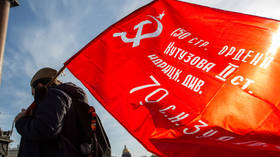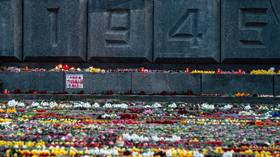EU state plans to ‘eradicate’ May 9 celebrations of victory over Nazis – minister

May 9 celebrations of the Soviet Union’s WWII victory over Nazi Germany could soon be completely discontinued in Latvia, Interior Minister Maris Kucinskis suggested in an interview with national broadcaster TV3 on Wednesday.
“A few more years, and we will be able to completely remove the red color from May 9,” the politician said, suggesting that “red flags” will soon be replaced by EU flags to commemorate Europe Day. “We in Latvia will never again celebrate May 9,” he added. Changing people’s minds, however, could take much longer, Kucinski admitted.
His comments came after the Latvian parliament last month officially banned any festive events, meetings, marches and pickets in celebration of Victory Day on May 9, describing such actions as “belittling and undermining the values of Latvia as a democratic and national state, including the division of society, the glorification of war, military aggression and totalitarianism, as well as a false interpretation of historical events.”
Latvia, along with the rest of the EU, marks the allied victory over the Third Reich on May 8, known as Victory in Europe Day, while Russia and several other countries mark the occasion a day later.
Riga’s stance comes as the Baltic nation still allows annual parades dedicated to Latvian Waffen-SS legionnaires – members of the combat branch of the Nazi Party’s security and surveillance agency. The most recent parade was held in March and featured hundreds of people marching in the Latvian capital to honor their compatriots who fought alongside the Nazis during WWII.
Despite the ban on May 9 celebrations, droves of Latvians nevertheless turned up to mark the historic day on Tuesday. Kucinski stated that the events passed relatively peacefully, and noted that the largest gatherings of people were at memorial sites in Salaspils and Daugavpils, where police had detained several people for launching fireworks.
According to Latvian news outlets, state police initiated 35 administrative violation proceedings and four criminal proceedings in connection with Victory Day celebrations on May 9. They also detained a total of 26 people.
Most of the cases involved the placement of flowers and symbols prohibited by the Latvian government, such as the St George ribbon, in places where dismantled Soviet monuments used to stand. Administrative violations were also filed for disobeying police.
Victory Day marks the day on which the remnants of the Nazi regime officially signed their unconditional surrender to the USSR and Allied forces at the end of World War II. Although the document was signed in Berlin on May 8, due to different time zones, Russia has historically celebrated the event on May 9, holding annual military parades to celebrate the victory of the Soviet forces, who did the lion’s share of the fighting in Europe during World War II at the cost of 8.7 million soldiers and up to 20 million civilian lives.
Latvia, along with its neighbors Estonia and Lithuania, were part of the Russian Empire from the late 18th Century until 1918, and part of the Soviet Union in 1940-41, and again between 1945 and 1991. The Baltic republics, however, view the Soviet period as an illegal occupation.













